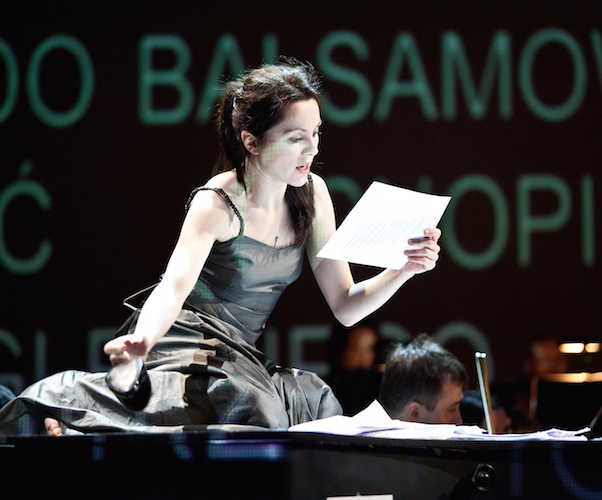Theater Review: “Chopin Without Piano”—A Problematic Idea
I wish I could say I was dazzled by the production’s concept, but once I grasped its cleverness I found the actual experience of Chopin Without Piano to be underwhelming.
Chopin Without Piano, written and performed by Poland’s Centrala. Directed by Michal Zadara. Presented by ArtsEmerson at the Emerson/Paramount Mainstage, Boston, MA, through November 14.

Barbara Wysocka in “Chopin Without Piano.” Photo: Natalia Kabanow.
By Helen Epstein
Chopin Without Piano is part of ArtsEmerson’s laudable program of bringing world art to Boston. This offering is from the Warsaw theater company Centrala; it is performed by Barbara Wysocka, who is accompanied here by an orchestra made up of Boston Conservatory student musicians conducted by Franck Ollu. And the production sounds like an arresting artistic idea: take a composer intimately bound up with his country’s culture, history, and identity (Chopin/Poland); choose two of his most popular works (the piano concerti); replace the solo piano line with an actor’s monologue and voila!—a Chopin retrospective that serves up an array of new conceptual and textual possibilities.
Centrala’s set is striking: a chamber orchestra grouped around a concert grand, littered with sheet music, books, and other props. The soloist, a young actress in concert attire, declaims in Polish from the piano bench. On it. Atop the piano. In dialogue with the conductor. Super-titles in English are projected on a screen above the orchestra.
Both Chopin concerti are performed in their entirety (three movements each), their piano parts eviscerated. The script that replaces the piano sections are drawn from Chopin’s own letters, reviews of his work and performances, comments from admirers and critics, biographers, historians, politicians, journalists, and musical interpreters.
The Polish text has been crafted to mimic the rhythm of the piano parts and includes music history (“In a Warsaw salon 1826, 15-year-old Chopin is playing…”) music analysis, descriptions (“The left hand is….while the right hand is…”), comments on the function of structural elements (“Repetition has an existential dimension…we need to feel at home in the world”) and, repetitively, an enactment of the notes themselves.
I wish I could say I was dazzled by the production’s concept, but once I grasped its cleverness, I found the actual experience of Chopin Without Piano underwhelming. Though I enjoyed the performance of the orchestral music, I missed the pianist and found the theatrics of the performer and her text all too predictable: they covered most of the usual romantic bases, including early virtuosity, illness (“I’m spitting blood”), nervousness, exile, nationalistic fervor, and the ways Chopin’s music was used and abused long after his death.
To be fair, I should point out that a reviewer better versed in Polish history than I and with a more intimate and admiring view of these two piano works would probably find this piece of music theater fascinating. We see and hear Chopin as a woman; Chopin as a symbol; Chopin as a language; Chopin as exile; Chopin as soul of Poland, among many other attributes.
Wysocka is a virtuoso performer with an energy and versatile vocal style that is put to full use by director Michal Zadara. But Chopin Without Piano left me unmoved. The words were a vivid reminder of the power of the music. ArtsEmerson will present a special concert featuring the two Chopin concerti as they were composed on Sunday, November 15 at 2 p.m.
Helen Epstein writes on the arts and is editorial director at Plunkett Lake Press.
Tagged: Barbara Wysocka, Centrala, Chopin without Piano, Culture Vulture
